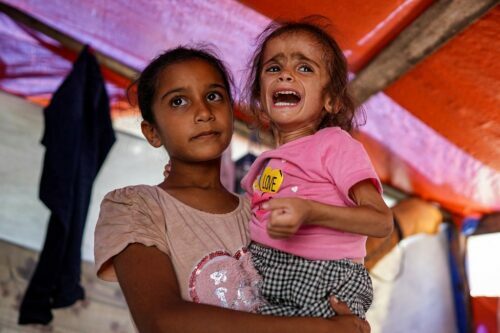GENEVA, Tuesday, June 4, 2024 (WAFA) – World Health Organization (WHO) Regional Director for the Eastern Mediterranean, Hanan Balkhy, that some citizens in Gaza are now reduced to drinking sewage water and eating animal feed, urging for immediate humanitarian access to the besieged Gaza Strip.
She warned that the Israeli war on Gaza had a knock-on impact on healthcare across the wider region. “And the impact on children will have severe lasting effects, WHO Regional Director told AFP in an interview at the WHO headquarters in Geneva.
She stressed that there are people in Gaza who are now eating animal food and grass and drinking sewage water.
“Children can barely eat, while the trucks are outside Rafah.”
The UN has long warned that famine is looming in Gaza, with 1.1 million people, around half of the population, facing catastrophic levels of food insecurity.
The UN humanitarian agency OCHA on Tuesday said access constraints “continue to undermine the safe delivery of life-saving humanitarian assistance throughout Gaza”, and conditions “further deteriorated” in May. “A trickle of aid goes in mainly through the Karm Abu Salem crossing with Israel.”
Balkhy stressed that Gaza needed “peace, peace, peace”, plus vastly increased aid access by land.
After a recent visit to the Rafah crossing from Egypt into the southern Gaza Strip, a vital conduit for aid that was closed early last month, she urged Israel to “open those borders”.
Balkhy said Karm Abu Salem was “not enough”, and the frantic efforts at maritime corridors and air drops made little sense when far less costly and more effective land routes already existed and “the trucks are lined up” outside.
Balkhy voiced frustration at the blocking of medical equipment, stating: “We’re talking about ventilators, purification chemicals to clean water,” the Saudi doctor said.”
Balkhy stressed the dire needs of patients in Gaza, with as many as 11,000 critically ill and wounded people requiring medical evacuation.
“The patients that are coming out are showing some extremely complex traumas: compound fractures, multi-drug resistant organisms, very maimed children,” she said.
“To rehabilitate people like this and treat them you need very complex health care,” Balkhy said, emphasizing the knock-on strain on fragile health systems in neighboring host countries, notably Egypt.
Last week, WHO warned there has been an “abrupt halt” to medical evacuations since Israel launched its offensive on Rafah in early May, warning more people would die while waiting for care.
As an infectious disease pediatrician, Balkhy spoke of the short- and long-term impacts of the conflict on children. She said the war had had a devastating toll on basic public health measures, such as clean water, healthy food and routine immunizations, leaving children susceptible to measles, chicken pox, diarrhea and respiratory illnesses.
“It’s going to have a huge impact on mental health. It’s going to cause huge post-traumatic stress syndromes,” she warned.
Regarding children rescued from under the rubble in Gaza, she said: “I don’t even know how you recover from that psychologically”.
As for the prospect of rebuilding Gaza’s shattered health system one day, Balkhy said: “The ambition from donors is high. “But without peace it’s impossible.”

